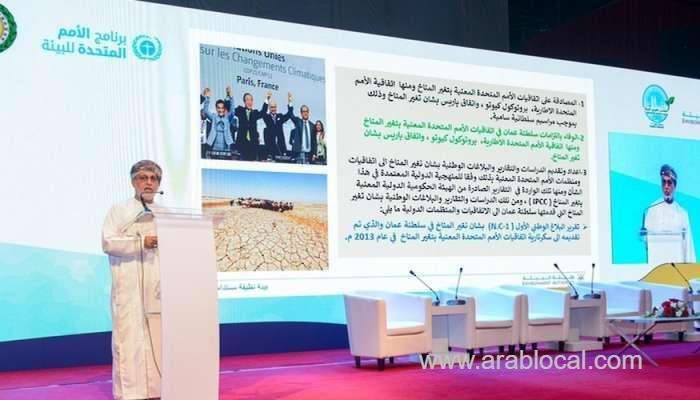
On Tuesday, the Sultanate of Oman hosted the second edition of the Arab Environment Forum. The forum, under the theme "Together to Confront Climate Challenges to Achieve Water and Food Security," delves into discussions surrounding climate change, its impact on food security and water resources, and strategies to address the triple planetary crisis while enhancing water and food security.
Dr. Abdullah Ali Al Amri, Chairman of the Environment Authority, emphasized in his address that the Sultanate of Oman, with the royal endorsement of His Majesty Sultan Haitham bin Tarik, had announced its commitment to achieve zero carbon neutrality by 2050. The country has also adopted a national strategy for a smooth transition to zero carbon neutrality by 2050, in alignment with Oman Vision 2040. Protecting the environment and preserving natural resources has been a fundamental component of Oman's comprehensive development.
Al Amri further highlighted Oman's focus on environmental safety, pollution control, and ecosystem preservation within the framework of Sustainable Development Goals (SDGs), evident through the issuance of various policies, strategies, laws, and regulations across environmental domains.
Dr. Mahmoud Fathallah, Director of the Department of Environmental Affairs and Meteorology at the Arab League, explained that the second iteration of the forum concentrates on addressing the issue of climate change and its consequences on water and food security, one of the foremost challenges faced by Arab countries.
Sami Demasi, UNEP Regional Director and Representative of the UNEP Programme in West Asia, stressed the need for collaboration between international, community, and academic organizations to confront environmental challenges related to climate crises, ecosystems, and cross-border pollution, especially given the concurrent environmental, economic, and social crises in the Arab region.
The forum, opened under the patronage of HH Sayyid Dr. Fahd Al Julanda Al Said, Vice Chancellor of Sultan Qaboos University (SQU), was organized by the Environment Authority in collaboration with regional and international entities. It features five working sessions that explore the relationships between drought and desertification and food and water systems, innovative investments, strategic foresight in the Arab world, and the shift toward resource sustainability, challenges, and opportunities for addressing climate change and ensuring water and food security.
The primary objectives of the forum include providing a platform for dialogue among stakeholders, policymakers, and international and regional experts in the fields of environment, climate change, and the green economy. It also serves as an avenue for sharing information and experiences in relevant environmental domains, fostering potential cooperation partnerships among various stakeholders, and establishing regional dialogues to discuss the present state and future prospects of environmental efforts in the Arab region.
Moreover, the forum aims to facilitate knowledge exchange and the sharing of best practices before two significant upcoming events: the Conference of the Parties to the United Nations Framework Convention on Climate Change (COP28) in the United Arab Emirates (UAE) and the sixth session of the United Nations Environment Assembly (UNEA-6) in Nairobi in February 2024. These events will center on effective, comprehensive, and sustainable multilateral actions to address climate change, biodiversity loss, and pollution.